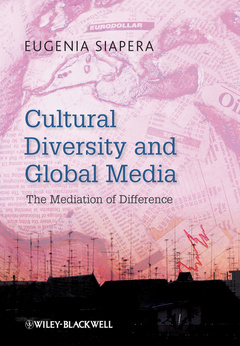Cultural Diversity and Global Media The Mediation of Difference
Auteur : Siapera Eugenia

- Summarises and critically discusses current approaches to multiculturalism and the media from a global perspecive
- Explores both the theoretical debates and empirical findings on multiculturalism and the media
- Assumes the new perspective of mediation of cultural diversity, which critically combines elements of previous theories in order to gain a better understanding of the relationship between the media and cultural diversity
- Explores media ?moments? of production, representation and consumption, while incorporating arguments on their shifting roles and boundaries
- Examines separately the role of the internet, which is linked to many changes in patterns of media production, representation and to increased possibilities for diasporic and transnational communication
- Contains pedagogical features that enable readers to understand and critically engage with the material, and draws upon and reviews an extensive bibliography, providing a useful reference tool.
1.1. The Crises of Multiculturalism
1.2. The Mediation of Cultural Diversity
1.3. The Structure of the Book
2. Theorizing the Nation
2.1. Theories of the Nation
2.2. A Word on Globalization
2.3. Conclusions
3. Varieties of Multiculturalism
3.1. A Typology of European Multiculturalism
3.2. Multiculturalism in Immigration Countries: US and Canada
3.3. Constitutively Different: India and Nigeria
3.4. Conclusions
4. Theories of Multiculturalism
4.1. Multicultural Dilemmas
4.2. Essentialism or Fluidity?
4.3. Universalism or Particularism?
4.4. Recognition or Redistribution?
4.5. Conclusions
5. Media Theories and Cultural Diversity
5.1. Socio-Psychological Approaches to Media
5.2. Medium Theory
5.3. Political-Economic Theories of the Media
5.4. Socio-Cultural Approaches to the Media
5.5. Mediation: The Difference Media Make
5.6. Conclusions
6. Media Production and Diversity
6.1. Media Production and Mediation
6.2. Media Corporations
6.3. Media Organizations and Media Logics
6.4. Media Workers
6.5. Conclusions
7. Minority and Diasporic Media: Controversies and Contributions
7.1. Why Study Minority Media?
7.2. Issues of Terminology
7.3. Theorizing the Role(s) of Diasporic Media
7.4. Diasporic Media: a Typology
7.5. The Politics of Diasporic Media
7.6. Conclusions
8. Theories of Representation
8.1. The Work of Representation
8.2. Stereotyping: the Cognitive Aspects of Representation
8.3. Framing and Discourse: a First Link to Ideology
8.4. Semiosis, Discourse, and Representation: an Historical Analysis
8.5. The Performative Force of Representation
8.6. Conclusions: Representation and Mediation
9. Regimes of Representation
9.1. The Multiplicity of Representations
9.2. The Racist Regime of Representation
9.3. The Domesticated Regime of Representation
9.4. The Regime of Commodification
9.5. Conclusions
10. Self-Representations of Cultural Diversity
10.1. Representational Dilemmas
10.2. The Essentialist Regime of Representation
10.3. The Alternative Regime of Representation
10.4. Conclusions
11. Audiences and Cultural Diversity
11.1. What Do People Do with the Media?
11.2. Audience Reception of Mediated Cultural Diversity
11.3. Ethno-Cultural Groups as Audiences
11.4. Media Consumption and Identity
11.5. Right to Reply: How Can Audiences Respond?
11.6. Conclusions
12. Cultural Diversity Online
12.1. The Difference the Internet Makes
12.2. Network Society and Cultural Diversity
12.3. Mediation of Cultural Diversity Internet Style
12.4. Conclusions
Bibliography
Index
Date de parution : 03-2010
Ouvrage de 232 p.
17.8x25.4 cm
Date de parution : 03-2010
Ouvrage de 240 p.
17.2x24.5 cm
Mots-clés :
cultural; multiculturalism; relationship; actively; media; constructs; cultural difference; understandings; cultural diversity; debates; position; society; order; diversity; siapera; argues; analysis; thorough; complexity; production



